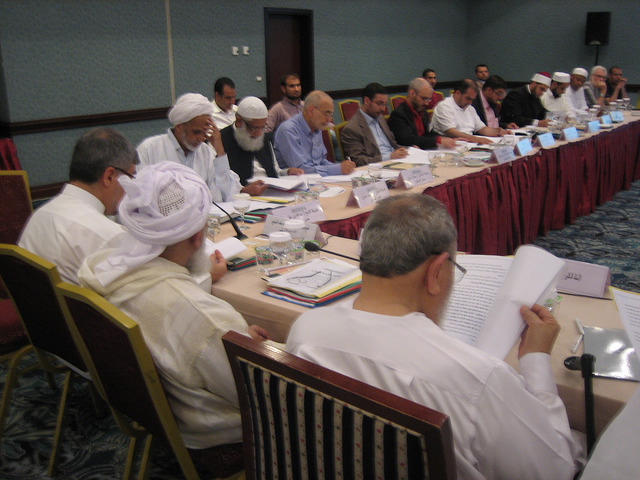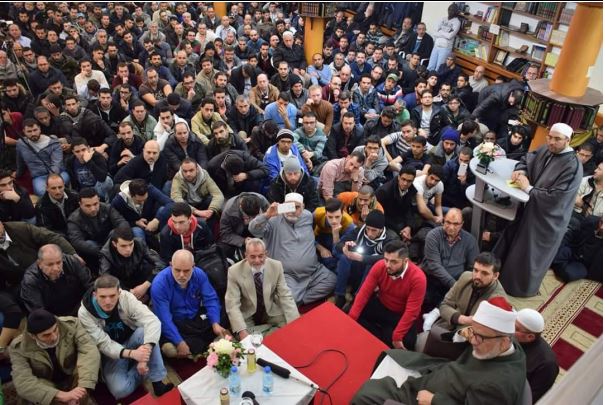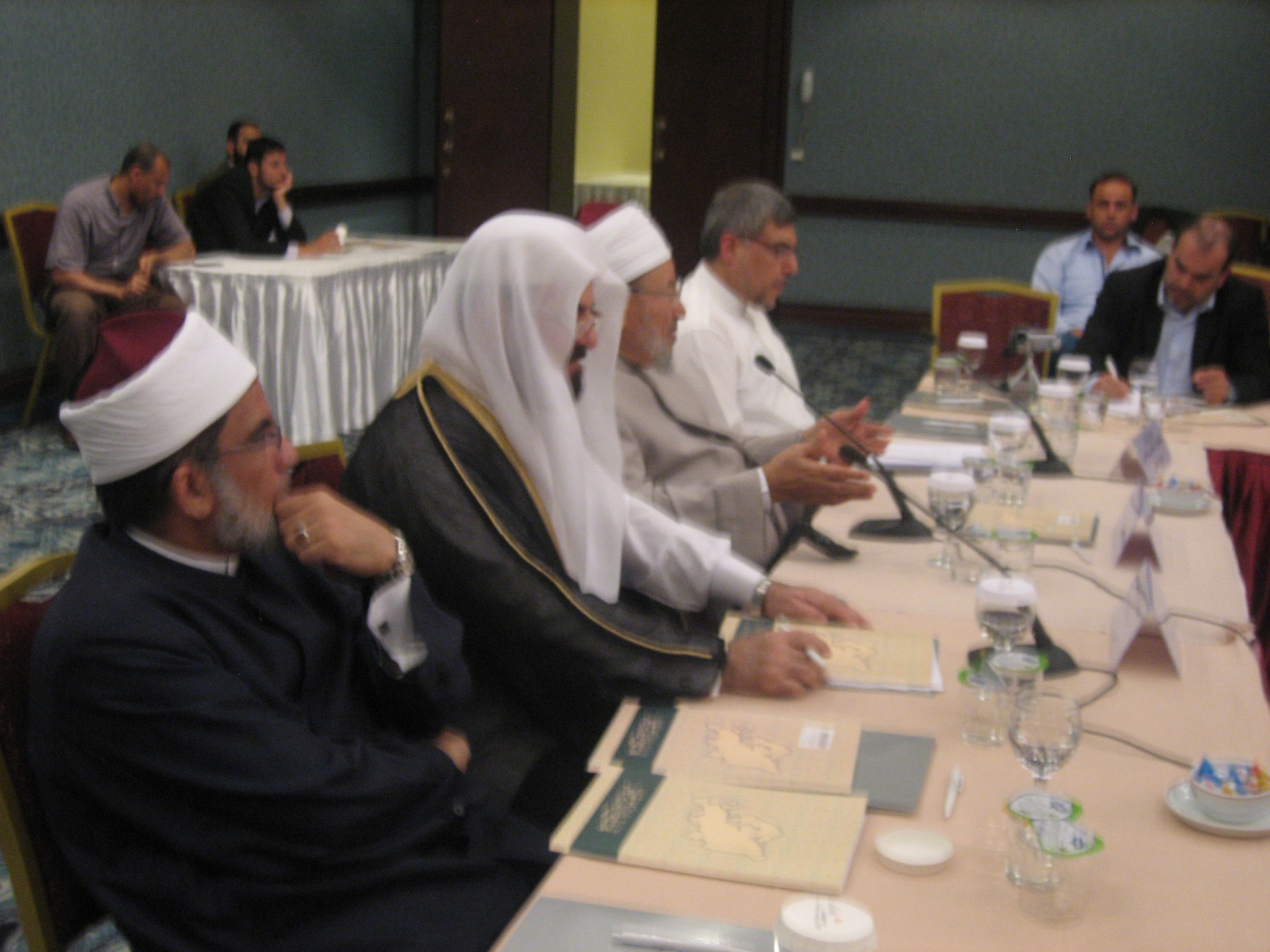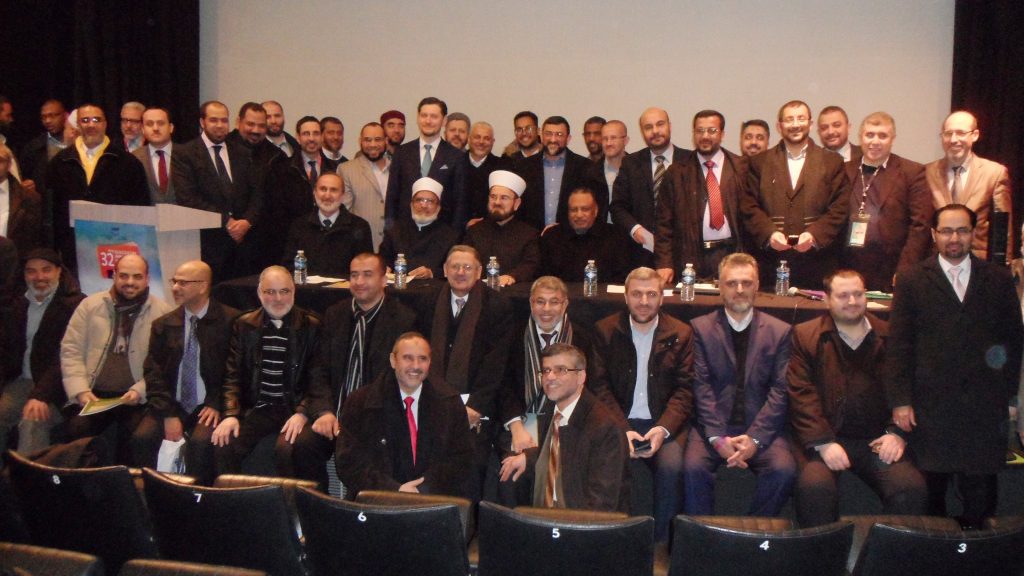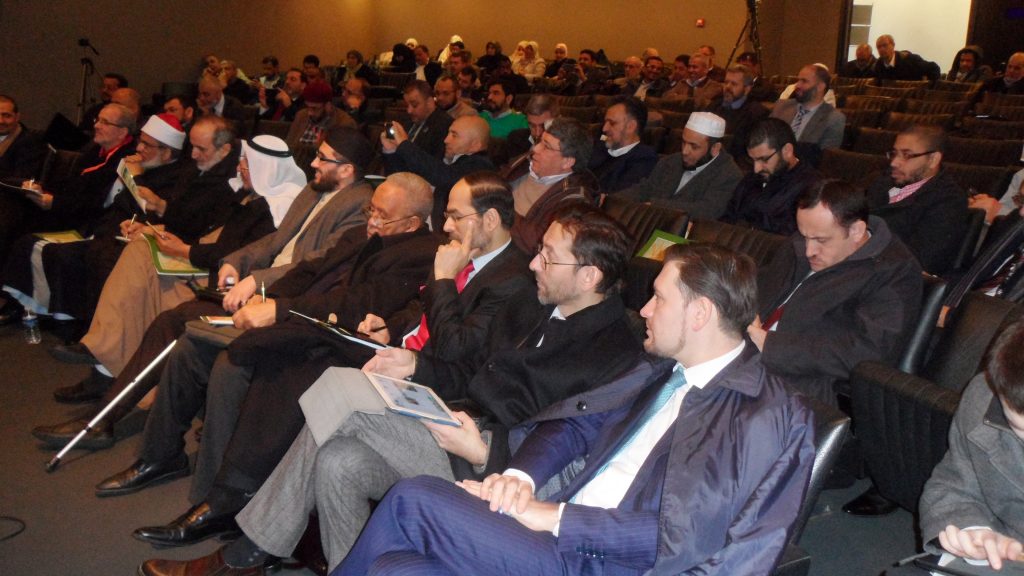The Fourteenth Ordinary Session of The European Council for Fatwa and Research
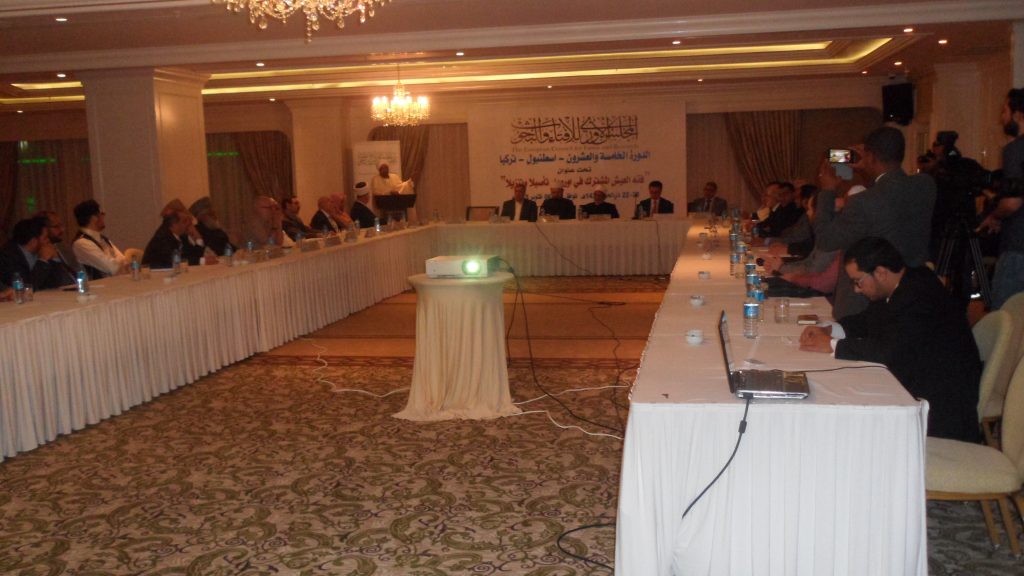
European Council for Fatwa and Research
Final Statement of
The Fourteenth Ordinary Session of
The European Council for Fatwa and Research
Held in Dublin, Ireland
During the period
14-18 of Muharram, 1426 AH
23-27 of February, 2005
In the Name of Allah, Most Gracious, Most Merciful
Praise be to Allah, the Worlds’ Sustainer, and peace be upon our leader Muhammad and on all his family and his Companions.
By Allah’s Grace and His Assistance the fourteenth Ordinary Session of the European Council for Fatwa and Research (ECFR) was held in Dublin, during the period 14-18 of Muharram, 1426 AH corresponding to 23-27 of February, 2005, chaired by His Eminence Sheikh Yusuf al-Qaradawi, and attended by most of the Members of the ECFR and a number of guests and observers.
His Eminence Dr. Sheikh Qaradawi inaugurated this session with a talk in which he stressed the objectives of the ECFR in terms of the accomplishment of an Authoritative Source that can tackle various issues of Muslims in the West. Dr. Qaradawi also crystallized that while reflecting firm methodology in making decisions regarding issuing Fatwas, resolutions and recommendations, as the ECFR study, deliberate and make sufficient researches on every issue until it becomes vividly clear, the ECFR is distinguished in adopting moderation taking into consideration removing any difficulties in the light of the Qur’an and Sunnah.
Arising from deliberation in the previous session, submission and discussion of the researches on “Fiqh of Muslim Family in the West” were made in succeeding meetings. In the administrative meeting the Secretary General submitted his periodic report covering the performance of the ECFR in the last period. The heads of the committees of Fatwas in England and France and the committee of research submitted concise reports about the performance of these committees since last session.
Ten researches were submitted and deliberated:
- “Marrying a woman from the people of the book” by Sheikh Mustafa Mula Auglu
- “Domestic violence and the solution” by Dr. Ali Qura Daghi
- “Mixed Marriage” by Dr. Sheikh Yusuf Al-Qaradawi
- “Compensation for incorporeal repercussions of divorce” by Dr. Ali Qura Daghi
- “Muslim Family in the West Between the Islamic Legislation and the positive Laws” by Dr. Muhammad Al-Amrani
- “Wife’s Right of Expenditures according to her level and her husband’s” by Dr. Sheikh Yusuf Al-Qaradawi
- “Challenges of Muslim Woman in the West” by Lina Larson
- “The Islamic Way of Estimating Alimonies” by Dr. Add-SSa-Tar Abu Ghidah
- “Means of prevention of divorce” Ali Qura Daghi
- “The Right of the Wife Willing to Get Divorced” by Sheikh Yusuf Al-Qaradawi
Based on the submission and deliberation on researches relating to the issues of Muslim Family in the West in this session and the previous one, the ECFR has issued the following resolutions:
Resolution 1/14
Fitness in Marriage
Upon deliberation of the research submitted in this regard, the ECFR reached the following resolution:
First: Through fitness in marriage the bride and the bridegroom, while enjoying harmony, can lead a continuous marriage. There will be no room for problems resulting from cultural discrepancies and social differences.
Second: The Islamic Law, while recognising the cultural aspects of some societies regarding differences and levels to preserve the family stability, introduces a preference based on righteousness and acquired skills calling upon dissimilating these differences and highlighting in a wise way of reformation righteous deeds and piety as the criterion of preference.
Third: The criteria of fitness in marriage reached by Muslim scholars through Ijtihad[1] were, in fact, based on the reality of their time since it had a profound impact on family relations and in particular the relations between husband and wife. This Ijtihad clarified that social and racial fitness could be replaced by fitness of behaviour.
Fourth: Consensually the highest criterion of fitness in marriage is piety.
Resolution 2/14
Pre-nuptial Medical Check up
Upon deliberation of the research submitted regarding “Pre-nuptial Medical Check up” i.e. rays, tests, genetic tests, etc. made to find out contagious sicknesses or illness that can affect the significance of marriage, the ECFR reached the following resolution:
First: In fact Pre-nuptial Medical Check up has advantages and disadvantages; it reveals sicknesses that may affect the decision of marriage. But this revelation may negatively affect the future and the psychology of the sick.
Second: Pre-nuptial Medical Check up including the genetic tests is Islamically legal, yet confidentiality should be observed.
Third: There is no harm in stipulating the Pre-nuptial Medical Check up prior to marriage.
Fourth: It is permissible that the fiancée and the fiancé agree to make a non-genetic Pre-nuptial Medical Check up, provided they observe the Islamic manners in terms of confidentiality and causing no harms.
Fifth: It is forbidden to conceal a contagious sickness or an illness that significantly affects the spouse. If it happens and a spouse gets sick or dies of this sickness, his/her spouse will be subject to punishments and compensations stated by the Shari’a[2].
Sixth: A spouse is entitled to invalidate marriage if it is proved that his/her spouse is a carrier of contagious viruses or has a sickness that negatively affects the significance of marriage.
Resolution 3/14
Guardianship in Marriage
Upon deliberation of the research submitted regarding “Guardianship in Marriage
” the ECFR reached the following resolution:
The Muslim scholars have two opinions in this regard:
The first view is to have a guardian is a prerequisite to enter into a marriage contract. This opinion is based on the hadith narrated by Abu Musa Al-Ashari t in which prophet Muhammad – peace be upon him – said: “There can be no marriage without a guardian.”
This opinion is held by the majority of Muslim scholars of Fiqh and hadith. Some of them categorized it as a pillar of the contract.
The second view states that a guardian is not a prerequisite of marriage. If a woman marries a fit man this marriage is valid.
This opinion is held by some Muslim scholars of Fiqh e.g. Hanafi School who support their opinion with other proofs.
These two opinions are highly respected. Upon deliberation the ECFR confirms the religious and social importance of the guardian’s consent when entering into a marriage contract. But in certain cases e.g. difficulty of getting the guardian’s consent or his continuous prevention of marriage, there is no harm in entering into the marriage contract without a guardian. If the contract is made without a guardian, it is valid according to the second opinion.
The ECFR clarifies that not every relative is fit to be the bride’s guardian in marriage. He has to fulfill certain conditions the most important of which is that what he does should be beneficial to her and not causing any harm to her.
Resolution 4/14
Forced marriage
Upon deliberation on the issue of “Forced marriage” the ECFR reached the following resolution:
The parents and the guardians have to marry their daughters with their consent. If a daughter approves of marriage it will be valid and visa versa. Prophet Muhammad – peace be upon him – said: “A deflowered cannot be married unless she expresses her approval and a virgin cannot be married unless with her permission.” They said: ‘O messenger of Allah! How does she express her permission?’ He – peace be upon him – said: “Her permission is expressed by her silence.” Reported by Al-Bukhari.
Ibn Abbas narrated that a virgin woman came to Prophet Muhammad – peace be upon him- and stated that her father married her without her consent. Prophet Muhammad – peace be upon him – gave her the choice of either terminating or continuing that marriage. In another narration it is stated that Prophet Muhammad – peace be upon him – nullified this marriage.
Resolution 5/14
Guardian’s Prevention of Marriage
Upon deliberation on the issue of “Guardian’s Prevention of marriage” and the research submitted in this regard, the ECFR reached the following resolution:
The guardian is not allowed to prevent a woman from marrying a man fit to her on the basis of dowry of her peeresses and if he does guardianship will be transferred to the one next to him or to the judge or whosoever represents the Muslims e.g. officials running Islamic centers and Imams in the West. Actually postponing marriage and guardian’s prevention of marriage have profound negative impact on the individual and society level. The phenomenon of guardian’s prevention of marriage is widely spread. Hence in Muslim society it is to be tackled in a way that would terminate it. In this regard it is vitally important to distinguish between the Islamic rules and customs and cultural aspects. It is also important to raise awareness of Islamic rules among Muslims via leaflets and courses and forming arbitrary councils to refer thereto.
Resolution 5/14
Mixed Marriage
Upon deliberating on the issue of marrying a Kitabiyah and the researches submitted in this regard, the ECFR reached the following resolution:
First definition of Kitabiyah: Kitabiyah is a woman that believes originally in a heavenly revealed religion e.g. Judaism and Christianity. In general she believes in Allah, the divine revelations and the hereafter. She is not an atheist or an apostate. She is not a believer of man-made religion.
The majority of the Muslim scholars hold to the perception of the permissibility of marrying a Kitabiyah. They quote from the Qur’an: “This day are (all) things good and pure made lawful unto you. The food of the People of the Book is lawful unto you and yours is lawful unto them. (Lawful unto you in marriage) are (not only) chaste women who are believers, but chaste women among the People of the Book, revealed before your time,- when ye give them their due dowers, and desire chastity, not lewdness, nor secret intrigues if any one rejects faith, fruitless is his work, and in the Hereafter he will be in the ranks of those who have lost (all spiritual good)” 005.005 YUSUF ALI Trans.
Some early Muslim predecessors, for instance Abdullah Ibn Umar, categorized marrying a Kitabiyah as disliked or forbidden.
In actual fact, the correct opinion is the opinion of the majority of Muslim scholars as the verse is vividly clear.
Second: Conditions to observe when marrying a Kitabiyah:
- That she has to be a true Kitabiyah according to the above mentioned definition. It is obvious that nowadays in the West not every daughter of Christian parents is a Christian. She could be a communist or a follower of any other belief not recognized by Islam. Being brought up in a Christian environment does not necessarily mean to be a Christian.
- That she has to be originally chaste or repentant chaste i.e. to refrain from adultery and fornication.
- That her people should not be ant-Islam or Muslims; unless it is proved that she has a different attitude. Allah said: “Thou wilt not find any people who believe in Allah and the Last Day, loving those who resist Allah and His Messenger.” (58:22) YUSUF ALI Trans. Marriage, in Islam, is based on love. Allah said: “And among His Signs is this, that He created for you mates from among yourselves, that ye may dwell in tranquility with them, and He has put love and mercy between your (hearts): verily in that are Signs for those who reflect.” (30:21) YUSUF ALI Trans.
- That this marriage should not cause problems nor should it be expected to cause definite harm nor most likely it may cause harm. Permissibility is allowed if it does not cause harm. If it negatively affects the public interest, it should be generally prohibited and if it negatively affects certain cases, it should be prevented in these given cases. The more serious the harm is the more stressed the prohibition is. Prophet Muhammad- peace be upon him said- “Harm is prohibited.”
The harm caused by marrying a Kitabiah is of the following types:
- This phenomenon can be widely spread to the extent that it may affect virtuous Muslim women fit to marriage.
- People may neglect the condition of chastity which is a must.
- Muslims’ offspring may deviate from Islam.
- Muslim husband may suffer repercussions in his life, i.e. being affected by his wife’s non-Islamic way, and after death in terms of issues relating to corpse and inheritance.
Resolution 6/14
Expenditure on Wife
Upon deliberating on the issue of Expenditure on Wife and the researches submitted in this regard, the ECFR reached the following resolution:
The Islamic Shari’a does not specify a certain sum, but it obliges the husband to spend on his wife and the criterion in this regard is the expenditure on her peeresses and the time and place.
The husband is to supply his wife with the provision she used to receive prior to marriage without exaggeration or parsimony. Allah said: “Let him who hath abundance spend of his abundance, and he whose provision is measured, let him spend of that which Allah hath given him. Allah asketh naught of any soul save that which He hath given it.” (65:07) PICKTHAL Trans.
Husband is also obliged to provide his wife with medication, clothing, food, accommodation and what is related thereto e.g. furniture etc.
As for expenses incurred because of the fact that the woman works, these should be covered by the working woman.
In the case of a mean husband, a wife is entitled to take an amount that would satisfy her needs and her children’s. Prophet Muhammad – peace be upon him – said to Hind,Abu Sufian’s wife: “Take what is sufficient to you and your children moderately.” Agreed upon
If the husband is poor and the wife is well off and works and is willing to cover the family’s financial needs, it will be completely her free choice and she will be rewarded in the hereafter and she is worthy of thanks.
Resolution 7/14
Domestic Violence and the Solution
Upon deliberating on the issue of Domestic Violence and the Solution and the researches submitted in this regard, the ECFR reached the following resolution:
Definition of Domestic Violence:
First: Violence is the application of material or abstract force in an illegal way to cause harm to others.
Second: Domestic Violence encompasses husband’s abuse of his wife, wife’s abuse of her husband, parents’ abuse of their children and visa versa. It includes physical abuse, sexual abuse, verbal abuse and threatening, social abuse and ideological abuse. The worst type of violence is killing for honour.
Third: The reasons of violence can be summed up as follows:
- Misunderstanding and weak religious conscience
- Wrong upbringing and rearing in a rough location
- Non-existence of dialogue and consultation among family members
- Wrong choice and discrepancies between the bride and the bridegroom in all aspects including the ideological ones.
- Difficult circumstances e.g. poverty and unemployment
Fourth: Domestic violence has critical repercussions on the bride and the bridegroom, children and society. Consequently the ECFR resolved that all types of Domestic Violence are prohibited in Islam. A Muslim is supposed to refrain therefrom since all sorts of oppression and harm are prohibited and that has been crystallized in many parts of the Islamic literature, let alone the Domestic Violence. The relationship among family members is established on mercy, love and tranquility.
The ECFR stressed the Islamic means to prevent the Domestic Violence. The most important of which are:
- Raising the religious conscience, applying the right methods in children’s upbringing and observing dialogue and consultation among the family members.
- Choosing one’s spouse in the right way.
- Raising awareness of the repercussions of oppression, hitting, cursing and insult via preaching and guidance.
- Arbitration
- Upon exhausting every possible means, divorce as a final solution can be reached through judicial authorities or the two arbitrators.
The ECFR recommends Muslim minorities to shun hitting wives within the family following the example of the prophet –Peace be upon him – who never tapped. The prophet – Peace be upon him – said: “The best amongst ye wilt not tap.” Moreover, it will incur repercussions and it violates the law.
Resolution 5/14
Means of prevention of divorce
Upon deliberating on the issue of Means of prevention of divorce and the researches submitted in this regard, the ECFR reached the following resolution:
First: The Islamic Legislation regarding Family reflects that Islam exhausts every possible means to preserve the Family and prevent Family disintegration. Hence, Islam categorizes marriage relations as a solemn covenant and encourages its continuity even if the bridegroom dislikes his bride. Allah said: “But consort with them in kindness, for if ye hate them it may happen that ye hate a thing wherein Allah hath placed much good.” (04:19) PICKTHAL Trans.
On this basis the ECFR clarified some Means of prevention of divorce the most important of which:
- Raising spirituality and Allah’s consciousness and observing Allah whenever a spouse oppresses or hurts the other and that is why the obligation of piety in the Qur’an is accompanied by most of the verses on family.
- Subtle manner of the bride and the bridegroom when dealing together. Each of them portrays patience towards his/her spouse encouraged by the good manners of his/her spouse.
- Observing each other’s feelings as each of them is a source of mercy and tranquility for the other and that each of them is described as the garment of each other. They have been created from a single being. Each of them should show respect to the other and perceive him/her as an equal partner.
- Choosing a virtuous spouse according to the stated characteristics by Islam and holding fast to the Islamic legitimate means for the continuity of marriage e.g. that the fiancé and the fiancée meet and talk without exceeding the limits.
- Raising awareness of the importance of dialogue and consultation as a means of sorting out problems between the bride and the bridegroom. Allah said: “If they both decide on weaning, by mutual consent, and after due consultation, there is no blame on them.” (02:233) YUSUF ALI Trans.
- Eagerness of both spouses to observe the material and abstract rights of the other on a basis of justice and kindness.
- Eagerness of both spouses to please each other. Hence it is not a lie to say something to reconcile or please one’s spouse, even though it might not true.
- Applying all means e.g. admonition
- Interference of two family arbitrators to make reconciliation. Allah said: “If ye fear a breach between them twain, appoint (two) arbiters, one from his family and the other from hers; if they wish for peace, Allah will cause their reconciliation: For Allah hath full knowledge, and is acquainted with all things.” (04:35) YUSUF ALI Trans.
Resolution 5/14
Compensation for incorporeal repercussions of divorce
Compensation for incorporeal repercussions means to compensate in money or other harm caused to another in terms of honour, feeling or psychology as a result of transgression or destruction or illegal action.
Upon deliberation the ECFR reached the following resolution:
On the basis of the proofs of prohibition of harms and preventing it, Islamically there is no harm in demanding compensation for incorporeal repercussions of divorce affecting somebody’s feelings, honour or psychology provided:
- That the incorporeal repercussions have real effects
- That the incorporeal repercussions of divorce are confirmed with proofs and evidence
- That the case should not be taken to court unless enough chance for reconciliation has been provided.
Resolution 5/14
A Message Submitted by the Islamic Committee for Woman and Child of the International Supreme Council for Da’wah and Relief
The ECFR was conversant with the message, submitted by Engineer Kamilia Helmi, General Director of the International Muslim Committee for Woman and Child of the International Supreme Council for Da’wah and Relief, requesting consultation regarding the forthcoming topics that will be submitted in the 49th Session of Woman’s Committee of the United Nations that will be held in New York in the period from 28th of February till 11th of March, 2005:
- Facilitating the health service of reproduction and andrology for individuals of all ages including children. This can be accomplished via:
- Inclusion of the Safe Sex subject in the programmes of Sex Education of primary schools demanded by International Documents of Woman and Child e.g. The Population’s and Peking’s Documents. Inclusion of the Safe Sex subject in media programmes directed to children in order to educate children practicing sexual intercourse on how to prevent pregnancy and HIV disease.
- Distributing contraceptives.
- Demanding for legality of abortion (Naming it Safe Abortion) for all individuals as a means of getting rid of unwanted pregnancy.
- Gender Equality that cancels all differences, including the biological ones, between the two sexes under the guise of restoring Woman’s rights.
Upon deliberation the ECFR reached the following:
First: Peking’s Document and all the declarations and conventions issued by the UN reflect increasing worries about Woman’s status all over the world aiming at its improvement via heath, literacy and woman’s participation in public life.
There is still a dire need of many efforts to relieve women and children and sort out problems arising from family disintegration and the wide-spread phenomenon of divorce and turning away from marriage, replacing it with other relations that result in prostitution and rampant illegal children and children’s vagabondage and deviation and care deprivation. In addition to that it gives room for children’s exploitation in the drug trade. It also encourages using woman’s body in advertisements and commercials and contributes to degradation of manners that leads to sexual intercourse outside marriage, homosexuality and lesbianism widely spread among teenagers causing serious psychological and sexual problems e.g. AIDS, adolescent pregnancy, spread of abortion and girls’ school evasiveness.
Second: The ECFR confirms that Islam perceives health as the greatest grace after the grace of faith. Hence it urges health care of all types; corporal, psychological, social, spiritual heath care. Part of that is procreation health with which we mean complete corporal, psychological and social health of the reproductive system and its functions and all that is pertaining thereto. In other words, facilitating all means that enable man to enjoy a healthy sound life including everything related to the issue of procreation.
Third: Islam, likewise all other divine religions, considers family the corner stone or the basic social unit and that it can solely be formed via marriage which is the only means through which youth can express their sexual desires preventing illegal children and sexually transmitted diseases. Expressing sexual desires through marriage is an act of worship for which both the wife and the husband will be rewarded.
Fourth: All types of sexual relations outside marriage are illegal in Islam. On this basis, Islam sets rules and aims for Sex Education taking into consideration hygiene and the establishment of the concept of family stressing that marriage is the only way to express sexual desires. Islam, observing chastity, embarks on programmes for Sex Education taking into consideration the issue of age and biological development for both sexes.
According to Islam it is prohibited to include pornography of any types in the Sex Education programme. Islam urges people to hold fast to chastity and to exert themselves in acts of worship e.g. fasting when marriage is not available.
On this basis, the ECFR does find any reason for distributing contraceptive means to children at schools. The ECFR sees it as a means of corruption and spreading evil.
The ECFR does not agree with the so called Safe Abortion, which means the availability of abortion for every individual as a means to get rid of unwanted pregnancy. Permissibility of Abortion in Islam is subject to certain conditions.
Fifth: The ECFR confirms that Islam calls upon equality between the two sexes in terms of general human rights and duties. Islam also recognizes woman as a full human being. It also recognizes her competency and financial independence. Islam also recognizes her rights of education, work, care and participation in public life. The ECFR condemns any discrimination between the two sexes. It also condemns establishing rights and duties on the basis of being male or female. The ECFR stresses that each sex has special characteristics denying that one sex is better than the other in all aspects.
Islam condemns all types of oppression practiced on woman e.g. female infanticide, deprivation of inheritance. Islam forbids any transgression or harm of woman.
Islam respects pluralism of religion, culture and identity and calls upon equality based on justice and equity.
Sixth: The ECFR call unto the United Nations and the International Organizations interested in Woman’s and Child’s affairs to refrain from interfering in peoples’ cultural and religious affairs and the pertaining thereto in terms of personal behaviour. This should be decided by peoples in conformity with their religion, culture and identity.
Second: The Fatwas
Fatwa 1/14
Smoking and trading in tobacco
Undoubtedly it has been proved that smoking is a reason for many killing diseases. All organizations of health all over the world warn against smoking repercussions. Most of the countries tread the same way to limit smoking, its consumption and tobacco trade. Moreover, it has been proved that its harm is not limited to smokers. It affects others known as passive smokers. It is bad and impure. Allah said describing Prophet Muhammad: “He allows them as lawful what is good (and pure) and prohibits them from what is bad (and impure)”(07:157) YUSUF ALI Trans.
It is consensually stated that whatever causes harm is prohibited. In addition, it is a waste of money which is forbidden too. Moreover, smoking enslaves the smokers. Taking into consideration the significance and the fundamental rules of the Shari’a, the ECFR stresses that smoking and tobacco trade are prohibited. “Harm is prohibited.” “Harm is to be removed.”
Fatwa 1/14
Zakat
Question:
From more than 7 years I have lent my brother and sister in Palestine an amount of money. As you are aware, they live in adversity and straitened circumstances. The situation has been more complicated after the Intifadah. I spare no efforts in helping them. I wish I could cancel the debt they owe me. But my income is a middle class one and I have been living in Bosnia for a long time. I own no premises either here or in Palestine. Can I calculate the debt that my brother and sister owe me as my annual Zakat until it is fully repaid? The value of this debt is $ 7000. In my best circumstances the maximum Zakat I pay is the amount of 1000 Dinars. If this is not allowed, can I cover the debt from donations that I collect to spend on charitable projects in and out of Palestine? Please note that some of this money is Zakat and some is public donations.
Answer:
Zakat is Allah’s right that Muslims possessing Nisab[3] have to fulfill. It is due to those who deserve it. Allah said:” And those in whose wealth is a recognized right for the (needy) who asks and him who is prevented (for some reason from asking)” (70:24-25) YUSUF ALI Trans.
Allah described his worshippers as “those who establish regular prayers and regular charity.”(05:55) The way to spend the Zakat is well explained in the Qur’an. Allah said: “Alms are for the poor and the needy, and those employed to administer the (funds); for those whose hearts have been (recently) reconciled (to Truth); for those in bondage and in debt; in the cause of Allah; and for the wayfarer: (thus is it) ordained by Allah, and Allah is full of knowledge and wisdom.”(09:60) YUSUF ALI Trans.
The majority of Muslim Scholars state that it is permissible to spend some or all of the Zakat on one type of the stated categories of Zakat Expenditures as long as it is seriously needed. From the various opinions of Muslim Scholars the ECFR, considering the significance of Shari’a and the goodness, choose that it is permissible to calculate the debt from your Zakat. As for the donations you collect for the benefit of the Palestinians, you cannot cover the debt from them and you should give them to the due persons.
Recommendations
Regarding the issue of Muslim family, the ECFR deliberated on newly formed formulas of marriage and resolved that even though in these new formulas the pillars of marriage are observed, but due to the fact that the husband is relieved from his duties, regarding providing accommodation and the expenditures of his wife, that the wife cedes in order to facilitate marriage and chastity, the ECFR does not encourage these formulas. The ECFR adjures Muslims to facilitate early marriage and shun all types of exaggeration in dowry, Walimah[4] and furniture abiding by the Islamic significance of chastity, tranquility and stability. The best environment to rear virtuous Muslim generation is the righteous environment. We also recommend Muslim youth –boys and girls- to make good use of the opportunities of assisting married people offered by the regulations in Europe to accomplish early marriage to shield themselves against deviation.
The ECFR also recommends Muslims living in the West to:
- Observe all rights and reflect a good image and a benevolent example through their words and deeds.
- Be creative and inventive and encourage that on all levels.
- Do their best to bring up the new Muslim generation – boys and girls- in a contemporary Muslim way via opening schools and educational and recreational centers to protect them against deviation.
- Work hard to establish firms and financial institutions that do not get involved in illegal transactions.
- Work hard to form legal (Shari’a) committees to regulate their family affairs according to the shari’a and in conformity with the laws of the country where they live.
- Work hard to attain the recognition of the state where they live of Islam as a religion and of Muslims as a religious minority like other minorities in respect to enjoying their complete rights and organizing their personal affairs, such as marriage and divorce according to the tenets of their religion.
- Commit themselves to what is stated in the Holy Qur’an and Sunnah and what Muslim Fuqaha’ (jurists) have unanimously agreed upon regarding the obligation of keeping the requirements of the pledge of security and the terms of citizenship and residence in the countries where they live.
- To avoid all means of illegal (haram) earning of all types, including the endeavor of some Muslims to get social welfare, when they are not entitled thereto.
- To shun all forms of violence and hold fast to mercy, clemency and wisdom when dealing with people in conformity to the Islamic commands. Muslims should also condemn any deviation from this Islamic way.
- The Council also recommends that Muslims in general and those dwelling in the West in particular adhere to Allah’s religion and brotherhood, tolerance, moderation, cooperation in matters of benevolence and righteousness, and adopt quiet dialogue and sound methods to solve controversial problems away from the programmes of strictness and paths of extremism that would distort the image of Islam and badly harm Muslims in general and Muslim minorities in particular. The enemies of Islam and those ignorant of it would defame it and warn others of it and its followers and instigate other nations against it. Allah Almighty says: “Invite (all) to the Way of your Lord with wisdom and beautiful preaching and argue with them in ways that are best and most gracious.” (An-Nahl 125)
Before concluding the proceedings of the Session a date has been made for the next session as follows:
The fifteenth Session will be held from Wednesday 29th of June till 03rd of July 2005.
The Council concluded the proceedings of the 14th Session by addressing sincere thanks and appreciation for al-Maktoum Charity Committee for their continuous support and sponsorship of the Council. The Council also extends sincere thanks to the Irish Government for their efforts to facilitate this session e.g. granting the members of the Council the required visas. The Council thanks the General Secretariat of the ECFR and all the brothers and sisters –employees of the ICCI and others- who contributed to the success of this Session.
Praise be to Allah initially and finally.
[1] Reasoning
[2] Islamic Law
[3] Minimum Zakatable amount
[4] Banquets

